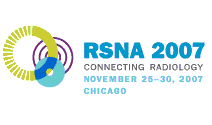
Abstract Archives of the RSNA, 2007
Su Metcalfe, Presenter: Nothing to Disclose
Michael Milano MD, PhD, Abstract Co-Author: Nothing to Disclose
Kevin Bylund MD, Abstract Co-Author: Nothing to Disclose
Therese Smudzin, Abstract Co-Author: Nothing to Disclose
Philip Rubin MD, Abstract Co-Author: Nothing to Disclose
Yuhchyau Chen MD, PhD, Abstract Co-Author: Nothing to Disclose
Palliative radiation (RT) for thoracic malignancies is effective in relieving symptoms from intrathoracic disease. Although a common practice, there is no consensus regarding the appropriate RT fractionation schedule. Hypofractionated RT in various schedules is advocated as these patients generally have short expected survival intervals, but this has been associated with increased risk of early acute radiation toxicity (Sundstrom, JCO 2004). Balancing symptomatic relief with RT side effects is essential to therapeutic intervention in these patients who often have poor performance status and/or significant co-morbidities. In the past two decades, a split-course hypofractionated RT schedule has been the favored schema at our institution.
We retrospectively reviewed the records of 158 lung cancer patients who received split-course chest RT between 1996-2006. These patients were not candidates for curative radiotherapy due to significant co-morbidities, poor performance status, metastatic disease and/or malignant pleural effusion. All patients were prescribed to an initial 25-35 Gy in 2.5 Gy daily fractions through AP/PA beam arrangements. After a 2-week break, an additional 10 Gy in 2.5 Gy fractions was delivered AP/PA, which was followed by off-cord beam arrangements to the final dose of 50-62.5 Gy in 2.5 Gy fractions. We analyzed chest symptom improvement, weight changes, treatment tolerance, RT toxicity and Kaplan-Meier survival of these patients
Of the 158 patients reviewed, 60.7% were male, 39.3% were female; median age was 68.5 (35-92), and more than 70% patients had KPS >70%. There was 94.3% NSCLC and 5.7% SCLC. Presenting symptoms: weight loss, 58%; SOB, 58%; cough, 64%; hemoptysis, 17%; chest pain, 27%; anorexia, 37%. Symptom improvement in evaluable patients was: 52% with <3% decrease in weight, 60% of SOB; 53% of cough; 46% of hemoptysis; 55% of chest pain; and 73% of anorexia. There were no grade 4 or 5 RT side effects, and combined grade 3 esophagitis and pneumonitis were seen in 2% only. Grade 1 and 2 esophagitis and pneumonitis were seen in 34% and 8%, respectively. Esophagitis from the first course of RT (25 Gy/2.5 Gy fractions) all resolved during the 2-week break period. 140 patients completed the initial course of 25 Gy, while 116 resumed the second course RT and completed the final prescribed dose. Median overall survival (OS) was 5.0 months. The 6-month, 1-year and 2-year OS was 45%, 26% and 15%, respectively with a non-significant trend for tumor stage, performance status, and histology. 76 patients had stage IV disease, with a median OS of 4.3 months.
Our data shows that split-course palliative chest RT is an effective fractionation schema not only in relieving multiple chest symptoms, but also in improving the constitutional symptom of anorexia from lung cancer. The scheduled 2-week break period allows for appropriate patient selection to complete the full course of palliative RT, and allows for the recovery of fatigue and grade 2 esophagitis from the first course RT of 25 Gy in 2.5 Gy daily fractions through AP/PA beam arrangements. The survival data suggest that this approach may have a potential survival benefit in a selected subgroup of patients with poor prognosis. This palliative RT schedule should be tested in a prospective study to compare with other chest palliative RT schema.
Metcalfe, S,
Milano, M,
Bylund, K,
Smudzin, T,
Rubin, P,
Chen, Y,
Split-Course Palliative-Intent Chest Radiotherapy for Lung Cancer. Radiological Society of North America 2007 Scientific Assembly and Annual Meeting, November 25 - November 30, 2007 ,Chicago IL.
http://archive.rsna.org/2007/6000839.html

